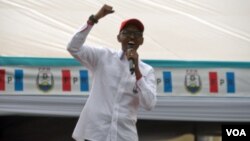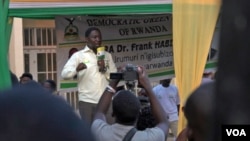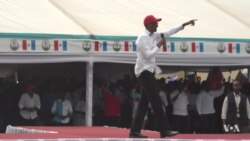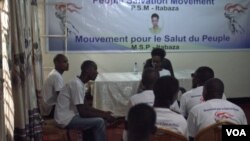Rwandans head to the polls Friday with President Paul Kagame widely expected to win a third term despite allegations of political repression.
Nine of the 11 registered political parties have endorsed the incumbent but a few candidates of other parties are still challenging Kagame.
More than 200,000 people attended Kagame's final pre-election rally on Wednesday near Kigali. Supporters drove for hours to the massive hilltop venue. They sang, danced and cheered while waiting for their candidate to arrive. They waved the red, white and blue flag of the ruling party, the Rwandan Patriotic Front.
Supporter Martha Kaiesu said Rwandans love Paul Kagame.
"He's a freedom fighter," said the 25-year-old Rwandan. "He has brought us peace, unity and reconciliation."
While dancing, supporter Fabrice Gafunguzo said Kagame is a "man of his word" who has delivered development and peace to the country.
Green Party candidate Frank Habineza held a much more low-key rally on the side of a road on the outskirts of Kigali earlier this week, attracting about 500 people. Motorcycle taxi drivers and chickens passed by, uninterested in the small gathering.
The low turnout was blamed on a government order forcing a change in location. Habineza founded the Green Party as an alternative to Kagame's rule. He has been hesitant to publicly criticize the president.
"We look at government policies," he explained. "If something is not going right, we criticize it, but also we give an alternative to that problem, the policy, but not individuals because individuals come and go. But government stays and the people stay."
Kagame has been in power for 17 years. A 2015 constitutional referendum, approved by 98 percent of voters, potentially allows him to remain in power until 2034.
In 2010, he won 93 percent of the vote.
Nevertheless, Habineza said he expects to win the election with at least 65 percent of the country's vote. At one of the last events of his campaign, nearly half the crowd at his rally stood across the street. Away from the camera and prying ears, some Rwandans told VOA they are afraid of what could happen to them if they publicly support the opposition.
Habineza supporter Charles Ndamage said he is treated like an "enemy of the country."
"Many people are afraid of expressing what they think," he said at the rally. "So even here as we are standing here maybe there are people that you can say are spies. Spies — they are everywhere."
But there are some calling for change.
Inside a gated house, with curtains drawn and doors shut, about 15 members of the People Salvation Movement discussed the future of their newly-formed organization on Tuesday.
Thirty-five-year-old accountant Diane Rwigara leads the group. She said she submitted more than double the required signatures to become a presidential candidate, but the National Election Commission rejected her candidacy.
In the small living room with her fellow activists, she speaks next to a portrait of her father, Assinapol Rwigara, who died in a 2015 car accident that she says was an assassination. Assinapol Rwigara used to be one of Kagame's major donors in the 1990s until the party allegedly made demands regarding Rwigara's businesses.
Living in fear
Since the People Salvation Movement is not a registered party, Rwigara says they only meet in private. She says it is risky for anyone to speak against the government.
"The main issue in country is fear," she explained. "It's beyond fear — it's terror. Fear of the ruling party. Fear of the state, where people get mistreated by government, by the people in power."
Kagame and his government claim the environment is free and open. "We have a lot of associations, be it political associations, parties or civil society. Everything is open here," said Wellers Gasamagera, the spokesperson for Kagame's political party.
Gasamagera told VOA Kagame's opponents use arguments about human rights as an excuse for their lack of popular support.
International human rights groups have alleged kidnappings, and politically motivated jailing of dissidents.
A new government policy this year required presidential candidates to have their social media messages pre-approved by the electoral commission. The policy was reversed following international criticism.
Boniface Twagirimana, the vice president of the opposition group United Democratic Forces of Rwanda, claims civilian-clothed intelligence operatives attempted to kidnap and strangle him in Kigali in December 2015. He says there's a chance the population will turn to civil violence.
"Maybe imagine there will be an explosion where they cannot continue being persecuted, being intimidated, being killed, being imprisoned when you react," he said. "Maybe anytime, the population will take other measures."
Twagirimana says he's putting his life on the line by conducting peaceful political advocacy for change. The chairperson of the United Democratic Forces of Rwanda, Victoire Ingabire, is serving a 15-year prison sentence on a conviction related to charges of terrorism and threatening national security, after running for president in 2010.
Polls open at 7 a.m. on Friday and results are expected by the end of the weekend.








